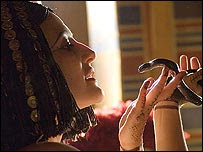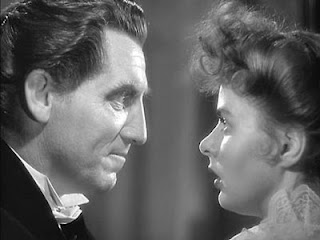 |
| (Kristy Cruz as Sherry and Rachel Gehlert as Grace in Dobama Theatre's production of "Tigers Be Still." Photo courtesy of Dobama Theatre.) |
By now, my multitudes of readers numbering in the dozens may have noticed my month-long silence. A brief explanation: in a life fixated on fiction, I try to make it a point to live up to such titles as the most happy fellow and the constant nymph. So when struck with what James Agee called a death in the family, I was temporarily stopped from chronicling local productions.
Allow me to offer an apology to Ensemble Theatre for not being able to make timely comments on their vibrant production of Clifford Odets' "Waiting for Lefty." Just as protesters were filling Wall Street and St. Clair Avenue in a stroke of perfect synchronicity, the theater offered a production of the ultimate protest play riveted in a picturesque anger that brought to mind one of Diego Rivera's murals of anguish. Artistic director Celeste Cosentino shows every indication of bringing this revered company into a happy new epoch.
Meanwhile, on Lee Road in Cleveland Heights, Dobama Theatre has found its voice in a cerebral ode to the disenfranchised. Anyone who grew up savoring the whimsical malcontents of "Catcher in the Rye" and "Catch-22" will appreciate the different flavors of alienation in Kim Rosenstock's "Tigers Be Still."
Director Marc Moritz has become a Merlin in the art of synchronizing the comic ticks and phobias of women who haven't left the couch in six months, teenagers expressing their anger through popsicle-stick art therapy, and a high-school principal who runs his school with the savvy of Moe, Larry and Curly. All in all, it's an evening of comic discontent for those who thrive on "The Daily Show."
 |
| (Mary Pickford in the 1919 silent movie of "Daddy Long Legs.") |
|
Moving downtown to Cleveland Play House, we have the local premiere of a new musical based on Jean Webster's "Daddy Long Legs." Long before teenage girls were swooning to the pop-diva witches of "Wicked," their great-grandmothers derived equal joy from the romantic letters of an orphan girl named Jerusha. This 1912 epistolary novel of Jerusha's growing attachment to her unseen benefactor, like "Wicked," is a lovely fable of female empowerment. Webster's idealization of innocent girlhood blossoming into spunky determination sparked three generations and was brought to life by such illustrious nymphs as Mary Pickford, Janet Gaynor and - ooh-la-la - Leslie Caron.
 |
| (Robert Adelman Hancock as Jervis and Megan McGinnis as Jerusha in Cleveland Play House's production of "Daddy Long Legs.") |
The new Paul Gordon-John Caird musical is approximately half a pleasure. It faithfully follows the trajectory of Webster's charming novel and contains a cast of two ideal performers, Robert Adelman Hancock as Jervis and Megan McGinnis as Jerusha. Each is as lovely and plaintive as any antique illustration. But - and this is a big one - they both have to contend with composer-lyricist Gordon's monotonous blankness. The score fails at its most essential task: to evoke the era and inner life of its source material. No matter how winning the story and cast, the lack of melodic inspiration proves to be an insurmountable obstacle, smothering its delicate story.
 |
| (Cara Corrigan as Fredrika Armfeldt and Dorothy Silver as Madame Armfeldt in Fairmount Center for the Arts' production of "A Little Night Music." Photo by Kathy Sandham.) |
|
On the other side of the musical-theater universe is Stephen Sondheim's "A Little Night Music." Based on Ingmar Bergman's film, "Smiles of a Summer Night," it also draws its existence from a gorgeous artifact. In this case, however, the music and lyrics embellish, enchant and transform its source material. There are two things no civilized Clevelander can afford to forgo, and they are both onstage at Fairmount Center for the Arts: on a national level, a major work by Sondheim, and on the local level, a major actress named Dorothy Silver.
To thrive, this 1973 musical needs glamor, wry sensuality and musical panache. Fortunately, Fred Sternfeld's production has all of these elements in varying degrees. In spite of costumes that often resemble corseted potato sacks, the conviction of the cast and the lilt of the waltzes bring to life the show's jaded romanticism.
Tracee Patterson manages to combine sophistication and heartbreak as the musical's yearning heroine, Desiree. Matthew Wright pulls off the difficult stunt of being a charming fool as Fredrik. Katherine DeBoer, as Charlotte, makes sexual jealousy a savory dish. And Luke Wehner, as Henrik, not only bears an uncanny resemblance to a young Buster Keaton, he's also as adept eliciting wounded, tender vulnerability as Keaton was at straddling a locomotive. Natalie Green sensually flames as the maid Petra, and, unfortunately, as the only canker in this blossom, Anna Bradley gives a performance of amazing vulgarity and ineptitude as Anne Egerman.
The hardest aspect of reviewing Dorothy Silver is not to give in to the temptation to make an allusion to the precious metal her name evokes. Of all the virtues of her performance, the two things worth noting are her uncanny ability to suddenly appear 20 years younger onstage and her genius at taking whatever mood she cares to emphasize - here, weary melancholy and wry mischief - and burn these images into our brain.
Even rendered on a miniscule budget, this musical remains an extravagant gift.
"Tigers Be Still" runs at Dobama Theatre through Sunday, Nov. 13. For tickets, call 216-932-3396.
"Daddy Long Legs" runs at the Allen Theatre in PlayhouseSquare through Sunday, Nov. 13. For tickets, call 216-241-6000.
"A Little Night Music" runs at Fairmount Center for the Arts through Sunday, Nov. 13. For tickets, call 440-338-3171.















































